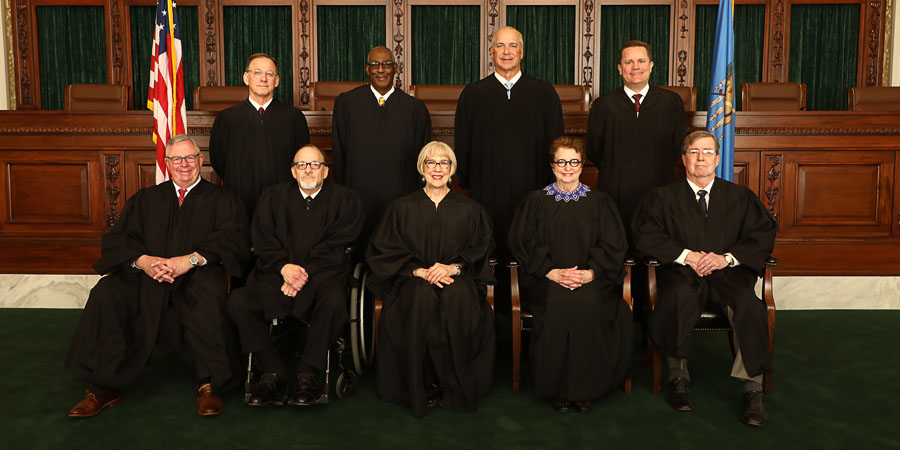
Fla., Okla., courts reject insurer attempts to block assignments of benefits
By onBusiness Practices | Insurance | Legal | Market Trends
The Oklahoma Supreme Court and Florida 3rd District Court of Appeals this month struck blows in favor of consumers and service providers relying upon the concept of assignment of benefits.
First, the Oklahoma Supreme Court on Dec. 15 reversed a lower court ruling holding that a CSAA clause forbidding assignment of a policy also forbade assigning post-loss claim payments.
The next day, Florida’s 3rd District held that Lloyd’s couldn’t use an anti-assignment declaration during the policy application process as an exception to Florida’s ban on such restrictions in contracts.
The decisions are positive developments for collision repairers who rely upon the concept of assignment of benefits, or AOB. A policyholder owed money by an insurer can assign the right to collect that money to a third-party service provider, such as a doctor, contractor or auto body shop. These third parties assume the role of the customer and can sue the insurer in an attempt to collect charges an insurer refused to reimburse.
However, the cases also demonstrate how the AOB process might not always proceed as smoothly as the consumer or provider might think.
The Florida case involved a claim from 2018, and the Oklahoma loss occurred in 2017. In both cases, the policyholder’s insurer initially won judgments that their contracts forbade post-loss assignments.
And the Florida case notes that lawmakers in 2019 allowed insurers to sell homeowner’s insurance contracts which partially or completely ban the assignment of post-loss benefits. This raises the risk of similar legislation being introduced for auto insurance in Florida and other states.
Oklahoma
Both lawsuits involve homeowner’s claims. In Oklahoma’s Johnson v. CSAA Tokiko Johnson assigned her benefits to Triple Diamond Construction, which estimated her house needed $36,346.06 in repairs after a storm. CSAA only estimated $21,725.36 worth of damage, prompting the lawsuit. The litigation included both allegations of breach of contract and bad faith.
The trial court didn’t rule on who was right. Instead, it merely dismissed the case as CSAA had requested on the grounds Johnson couldn’t assign her claim to Triple Diamond.
“(CSAA) raised one argument: Johnson’s policy and 36 O.S. § 3624 prohibit an assignment of the policy,” Oklahoma Justice James Edmonson wrote.
The Oklahoma statute holds: “Except as provided in subsection D of Section 6055 of this title, a policy may be assignable or not assignable, as provided by its terms.” Edmonson described the CSAA policy as one that “requires insurer’s consent for assignment of the policy.”
CSAA argued that a claim also counted as part of a policy.
However, Edmonson and seven other justices ruled it didn’t and sent the case back to the lower court.
“An insured possessing an insurable interest may assign a post-loss chose in action based upon a claim against a property insurance policy without violating an insurance policy clause requiring written consent of the insurer for assignment of the policy,” Edmondson wrote.
Judge M. John Kane IV also agreed that post-loss claims could indeed be transferred in this situation, but he dissented on the majority’s decision to not bother ruling yet on the idea of assigning bad faith claims. “I would hold as a matter of law (bad faith) is not assignable,” he wrote.
Edmondson quoted his court’s 1957 decision in American Alliance v. McCallie:
It seems to be the rule, followed by most courts, that where such a policy is in force and effect at the time the insured property burns, by the happening of the latter event, the relationship between the insurer and the insured becomes simply that of debtor and creditor; and that the chose in action, which the latter then has against the former, may be validly transferred to a third person, by assignment, without compliance with the policy’s requirement that the insurer’s consent thereto (by endorsement or otherwise) be obtained.
He said “chose in action” is a common law term that today describes something with an assignable legal right.
Edmondson also demonstrated how the U.S. Fifth Circuit Court of Appeals backed the idea that the majority of courts held post-loss assignments weren’t prohibited by restrictions on assigning a policy.
While interpreting Texas law in 2010’s Keller Foundations v. Wausau Underwriters, the Firth Circuit wrote:
According to Couch on Insurance, “the great majority of courts adhere to the rule that general stipulations in policies prohibiting assignments thereof except with the consent of the insurer apply only to assignments before loss, and do not prevent an assignment after loss.” These courts reason that “[t]he purpose of a no assignment clause is to protect the insurer from increased liability, and after events giving rise to the insurer’s liability have occurred, the insurer’s risk cannot be increased by a change in the insured’s identity.”
(Ironically, the Fifth Circuit went on to observe that Texas was in the minority of states which didn’t follow this rule.)
“Courts adopting the majority position have relied on a long-recognized public policy against restraints on assigning a chose in action, and they have stated this policy supersedes or outweighs a public policy favoring contractual freedom to create such a restraint in a contract of insurance,” Edmondson wrote.
Edmonds and the majority also seemed to ridicule the idea that the Legislature meant the word “policy” to include claim proceeds.
“In summary, insurer contends the Legislature created a statutory meaning for ‘policy’ that was contrary to a ‘well-settled’ legal principle used by courts in other states construing insurance contracts for the then previous 75 years,” he wrote.
Edmonds pointed out that CSAA cited nothing supporting its broad definition and also undercut its own case by introducing ambiguity into the term:
No Oklahoma insurance statute or Oklahoma authority is cited by insurer for making the term “policy” to be broad enough in scope to include Johnson’s assignment of a post-loss chose in action. Insurer points to no language in Johnson’s policy defining the term “policy” as including an assignment of a chose in action. Insurer argued an insured may not split a “policy” into smaller pieces and then classify a piece as a “claim” for the purpose of an assignment, because a “policy” may not be assigned. Insurer equates the meaning of “policy” with a “chose in action” when the latter is based on a policy-created obligation. Insurer’s argument injects ambiguity into the meaning of the term “policy” by arguing for a definition of “policy” not found in (1) an insurance statute, or (2) the historical and ordinary meaning of the term which distinguishes a “policy” and a “chose in action,” or (3) a policy-defined meaning for “policy” in this appeal. The language “assignment of this policy” in Johnson’s policy is not ambiguous; but insurer’s argument would create an ambiguity and it would not ultimately support insurer’s argument against an assignment since ambiguity would be resolved against the insurer.
Florida
The Florida case involved homeowners whom Lloyd’s argued negotiated away their rights to assign post-loss benefits.
Julio and Nora Lugones had a homeowner’s policy with Lloyds at the time their house was damaged in 2018. After obtaining an assignment of proceeds, Extreme Emergency billed Lloyd’s the $18,458.39 the construction company charged to fix the house. The insurer refused to pay the claim, and Extreme Emergency sued for an alleged breach of contract.
Lloyd’s argued that when the Lugoneses were signing up for the policy, they agreed to an “Anti-Assignment Endorsement” which stated:
In consideration of the premium paid, it is hereby agreed and understood that rights, benefits and duties under the policy for which I am applying may not be assigned and/or transferred, either before or after a loss, without the written consent of the company, except in the case of death of an individual named insured.
The trial court agreed, issued summary judgment on Lloyd’s behalf, and denied an Extreme Emergency motion for rehearing.
 This violated Florida law, according to the 3rd Circuit Court of Appeals.
This violated Florida law, according to the 3rd Circuit Court of Appeals.
“For more than a century, the law in Florida has been well-settled: an insured need not obtain the consent of the insurer before making a post-loss assignment of its right to payment of a claim under an insurance policy, and any attempt by an insurer to restrict the insured’s right to do so is invalid,” Chief Judge Kevin Emas wrote in the court’s 3-0 decision. Judges Alexander Bokor and Monica Gordo concurred.
“Applying a century of well-established Florida law to this 2017 contract of insurance, the anti-assignment provision was ineffective to prevent or restrict the insured from making a post-loss assignment of the right to payment of a claim without the insurer’s consent, and the fact that the anti-assignment clause was placed in the application, rather than the policy itself, is immaterial.”
Lloyd’s had tried to argue that this situation was different — it and the Lugoneses had negotiated those contract terms, according to Emas.
“In other words, Lloyd’s argues, this case is somehow unique in that the insurer did not unilaterally interpose this anti-assignment clause into the insurance policy; instead, this was a contract term negotiated with the insureds and set forth in the application for insurance, rather than in the insurance policy itself,” Emas wrote.
The court said no. “After all, it is the insurance application and the insurance policy which together constitute the insurance contract,” Emas wrote. (Emphasis Emas’.)
Emas also in the opinion noted that the century of Florida law forbidding anti-claims-assignment clauses came to an end in 2019.
The Florida Legislature passed Florida Statute 627.7153 for policies created or renewed effective July 1, 2019. The law states insurers can restrict post-loss benefits so long as they sell a policy without restrictions and charge lower tiers of premiums for the policies with partial or complete restrictions.
The policy and form discussing the agreement to surrender assignment rights must warn the policyholder of its contents using 18-point type.
Images:
The 2020 Supreme Court of Oklahoma is shown. (Provided by Oklahoma Supreme Court)
A photo illustration of Oklahoma law. (Baris-Ozer/iStock)
Florida 3rd District Court of Appeals Chief Judge Kevin Emas is shown. (Provided by 3rd District)


